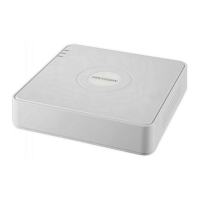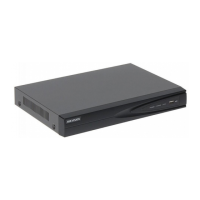Do you have a question about the HIKVISION DS-7816NI-I2/16P and is the answer not in the manual?
| Model | DS-7816NI-I2/16P |
|---|---|
| Category | Network Video Recorder |
| Video Input | 16 Channels |
| IP Video Input | 16 Channels |
| Two-Way Audio | Yes |
| Decoding Format | H.265+/H.265/H.264+/H.264 |
| Synchronous Playback | 16 Channels |
| Operating Humidity | 10% to 90% |
| Supported Camera Resolution | Up to 12MP |
| Video Output | HDMI, VGA |
| HDMI Output Resolution | 4K (3840x2160) |
| VGA Output Resolution | 1920x1080 |
| Audio Output | 1 Channel |
| Recording Resolution | Up to 8MP (3840x2160) |
| HDD Slots | 2 |
| Hard Disk | SATA |
| Network Interface | 1 RJ-45 10/100/1000 Mbps self-adaptive Ethernet interface |
| USB Interface | 2 x USB 2.0 |
| Power Supply | 100-240V AC, 50/60Hz |
| Power Consumption | < 15W (without HDD) |
| Operating Temperature | -10°C to 55°C |
| Max HDD Capacity | Up to 10 TB capacity for each HDD |
Provides essential tips for safe installation, operation, and handling of the device.
Guides the initial activation process for the network video recorder.
Explains how to activate the device using the local menu interface.
Describes the activation process using the SADP software tool.
Outlines activating the device using the provided client management software.
Details how to activate the device using a web browser interface.
Explains how to configure network TCP/IP settings for device operation.
Instructions for installing and initializing Hard Disk Drives (HDDs).
Steps to add network cameras to the device for video monitoring.
Connects network cameras using Power over Ethernet (PoE) interfaces.
Enables remote access and management via the Hik-Connect service.
Customizes On-Screen Display settings for cameras, like date/time and name.
Adjusts image settings such as brightness, contrast, and day/night switch.
Sets privacy masks to conceal specific areas of the camera's view.
Upgrades the firmware of connected IP cameras through the device.
Initiates and displays the live video feed from connected cameras.
Customizes live view parameters like output interface, mode, and dwell time.
Arranges camera display windows and creates custom layouts for live view.
Controls the Pan, Tilt, and Zoom functions of PTZ-enabled cameras.
Sets communication parameters for controlling PTZ cameras.
Records and saves specific PTZ camera positions for quick recall.
Moves the PTZ camera to a previously saved preset position.
Defines a sequence of PTZ movements and dwell times for automated patrolling.
Activates a pre-defined patrol path for the PTZ camera.
Records and saves PTZ camera movements to create custom movement patterns.
Executes a pre-recorded pattern of PTZ camera movements.
Settings and configurations related to video recording.
Sets video parameters like resolution, frame rate, and bitrate for recording.
Sets a schedule for automatic video recording based on time and event types.
Accesses and reviews recorded video files.
Configures standard event detection types like motion and video loss alarms.
Sets up motion detection rules, areas, and sensitivity for alarm triggering.
Configures alarms and responses for detection of video loss from channels.
Sets up alarms and responses for camera lens tampering detection.
Configures handling actions for external sensor alarm inputs.
Handles Video Content Analysis (VCA) events sent by connected IP cameras.
Detects and alerts on normal or abnormal temperatures from thermography cameras.
Detects smart, facial, vehicle, and human body targets in live view.
Sets schedules for when event detection and alarms are active.
Defines actions to be taken when an alarm or exception occurs.
Connects and adds Internet of Things (IoT) devices to the recorder.
Specifies conditions to search for videos and pictures.
Performs intelligent searches based on various criteria like face or human detection.
Searches for face images using comparison results or appearance.
Searches for pictures based on human body detection alarms.
Searches for and views matched vehicle pictures using various criteria.
Manages storage devices like HDDs, network disks, and cloud storage.
Configures HDD groups, properties, and quotas for local storage.
Adds NAS or IP SAN disks to the device as network HDDs.
Enables software-based disk arrays (RAID) for enhanced data redundancy.
Configures the recorder's working mode as normal for hot spare system operation.
Configures a device to operate in hot spare mode, taking over tasks upon failure.
Manages user accounts, including adding, editing, and configuring permissions.
Steps for adding new users with specified roles and permissions.
Modifies the administrator account's password and unlock pattern.
Edits information for operator or guest user accounts, including passwords.
Assigns specific permissions for local and remote operations to users.
Configures detailed permissions for local, remote, and camera operations per user.
Procedures for resetting the admin password using various methods.
Resets the admin password by importing a GUID file via the web browser.
Resets the admin password by answering pre-configured security questions.
Resets the admin password using a verification code sent to the reserved email.
Resets the admin password using verification codes obtained via Hik-Connect.
Configures general device settings like language, resolution, and device name.
Detects bad sectors on HDDs to identify potential storage issues.
Performs S.M.A.R.T. (Self-Monitoring, Analysis, and Reporting Technology) checks on HDDs.
Views the health status of HDDs to troubleshoot potential problems.
Upgrades device firmware using local backup or remote FTP servers.
Upgrades firmware using a firmware file from a local storage device.
Upgrades firmware via an FTP server by copying the file to the device.
Upgrades firmware automatically or manually through the Hik-Connect service.
Searches, views, and exports system logs for device operation and events.











